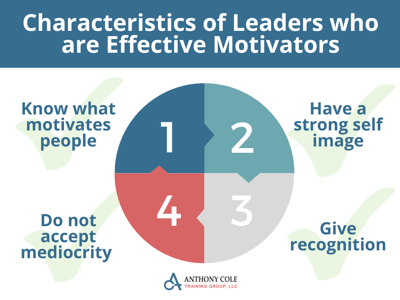There are two sides to this topic of motivation. One side is how are your salespeople motivated and what motivates them. The second side is how effective are you as a sales leader at motivating your sales team? Both must be addressed to fully understand this topic of motivation and the impact on sales results.
Qualities of a Motivational Sales Leader
Certainly, understanding who you are hiring from the start is essential in having a team that is motivated to reach their sales goals. As a part of the hiring process, leaders must consistently use an assessment, preferably a sales-specific assessment, to identify if candidates are motivated, can sell, and will sell. We all understand that motivation is primarily an internal quality driven by personal factors of having goals, the desire to achieve, compete, and excel. However, there are also certain qualities that leaders must have to uncover and ignite the flame of those they motivate.
Drawing from Objective Management Group’s sales manager assessment, our partner and the pioneer of the sales assessment industry, we know that these are the characteristics of leaders who are effective motivators:
- Know what motivates people
- Have a strong self image
- Give recognition
- Do not accept mediocrity

Sales Leaders Must Know What Motivates Their People
When we first started evaluating sales teams 25 years ago – the findings told us that people were externally motivated. Motivation was money and the things money can provide. The current findings tell us that sales teams are highly motivated to succeed, but the source of motivation is internal rather than external. They are more motivated by a job well done, taking care of, and being a guide for their clients. They want to be recognized for success and they are motivated by achieving their own personal standards for success and achievement. As a sales leader, it is your job to find out what motivates your people and then you can have the appropriate discussions to keep them on track.
Sales Leaders Must Have a Strong Self Image
Much like salespeople, leaders must be internally motivated to develop and help others. This is often a problem when a leader is promoted from a sales position due to their success at driving sales and revenue into a sales leadership role in which the focus is achieving success through others. Some can make that transition and others do not. Leaders with a strong self image will spend time developing their own skills through the many resources available today from training and online as well as books and podcasts.
Another way to improve self-image and success as a leader motivating a sales team is to implement management practices that allow you to understand the activities and behaviors for potential coaching opportunities. A strong sales leader will hold regular sales huddles focused on the most critical activities that drive success, such as appointments and proposals. They will have regular monthly sales meetings to help their team sharpen their saw, improve and learn from each other. Probably most importantly, sales leaders will implement a process to uncover personal and professional goals of their sales team so they can understand what motivates them. Implementing these activities helps sales leader become more effective in their role as a sales motivator and will improve their self-image and success.
Motivating Your Team with Regular Recognition (and Feedback to Improve)
Many, but not all salespeople thrive on winning, positive feedback, and recognition, so this is a given for effective sales leaders. Find opportunities to recognize the efforts, behaviors, and success of your team members, whether it is one-on-one or in a group setting. Leader boards, celebrating wins, and giving rewards are all motivating factors.
But what about the other end of the stick? An effective sales leader must be focused on motivating a salesperson who is going off track, not doing the behaviors needed or agreed upon for reaching their sales goals. To motivate a sales team, leaders must have practices and processes in place to catch lagging behaviors quickly before they become a real problem. Coaching and motivating are very closely related. If a sales leader can help identify what is getting in the way of a salesperson attaining more appointments and can coach them to improvement, that can be very motivating for a salesperson.
Strong Sales Leaders Do Not Accept Mediocrity
Most leaders will tell you that they do not accept mediocrity however if you review their stack ranking, they have and keep low performers. Every company has a lowest performer. But what can a sales leader do to improve performance overall so that each year, that lowest performer is better than before?
We coach organizations and leaders to Set the Bar for Success by:
- Clearly establishing and communicating what it means to be successful in the organization.
- Have systems and processes in place to catch failure before failure happens rather than when it actually happens. Failure never happens all at once.
- Track the improvement of performance quintiles year over year. When you take the snapshot next year, the numbers for each quintile have to be better than the previous year.
- Establish a culture and commitment to set the bar higher for success and then hold people accountable to actually doing the behaviors required to be successful.
Motivating a sales team to success is no easy achievement. It takes consistent and persistent behaviors. Strong sales managers do not worry about being liked by their salespeople. They achieve success when their salespeople become more effective and successful.



